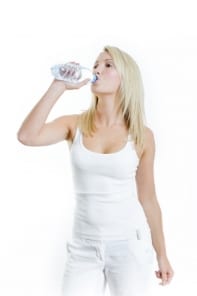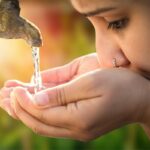Is drinking water really important?
We’ve heard a lot of major healthcare authorities offer opinions on water consumption, but few are more reputable than the Mayo Clinic’s “nutrition and eating” pages, which include a section devoted entirely to water. Even the Mayo Clinic staff admits there is no single formula for determining a person’s ideal fluid intake.
Water is essential to life.
Without adequate amounts of water, your body will suffer a great deal of stress including:
- Dry, sticky mouth
- Sleepiness or tiredness — children are likely to be less active than usual
- Dry skin
- Headache
- Constipation
- Dizziness or lightheadedness
- Sunken eyes
- Shriveled and dry skin that lacks elasticity and doesn’t “bounce back” when pinched into a fold
- Low blood pressure
- Rapid heartbeat
- Rapid breathing
Estimating your ideal water consumption
How much water or fluid does the average, healthy adult really need? Assuming you are living in a temperate climate, The Institute of Medicine says that men need about 3 liters and women need about 2.2 liters.
“…men need about 3 liters and women need about 2.2 liters”
While it might be easier to stick with the well-known formula and drink eight glasses of water each day, it’s important to remember that all fluids count toward the daily total. Not surprisingly, most health professionals would agree that water is better than sugary soft drinks and caffeinated beverages.
Does quality of water matter?
There are a number of reasons why hiring a water delivery company in Colorado Springs can make the difference between healthy hydration and dehydration. Poor water quality not only exposes your body to minerals, contaminants and flouride but can also taste terrible. Having access to great quality water from a reverse osmosis system in your home or bottled water delivery can encourage you to drink more clean water.
Water keeps your body functioning well
Considering that 60 percent of your body weight is made up of water, it is not surprising that water performs some very important bodily functions in the body. In fact, every system in the body is dependent on water. It carries nutrients into cells, flushes toxins from vital organs and provides moisture for the ears, eyes, nose and throat.
The body loses water in many different ways – through perspiration, breath and digestive functions – and this water must continually be replenished. When the body is dehydrated it can make you feel drained and tired. Keeping bottled water handy helps stave off your chances of becoming dehydrated.
Is water always the best drink?
If you are engaging in long and intense bouts of exercise, it might be best to supplement your water intake with a sports drink that contains sodium. Drinks like Gatorade and Powerade contain electrolytes that help replace lost sodium during exercise, but it is also important to continue replacing fluids after an exercise session is finished.
Runners, athletes and other active people may need to modify their total fluid intake, but there are other factors that influence the need for liquids. For example, if you live in a humid climate or take a lot of daily medications, it’s always a good idea to drink more water.
Spring water contains valuable minerals that improve taste and aid in hydration.
Pregnant women and nursing mothers should dramatically increase their fluid intake to meet the needs of the baby. Anything that causes fluid loss will require that you drink extra water to compensate. How much additional fluid you need depends on how much you sweat during physical activity, as well as the duration and type of exercise.
Beverages such as milk and juice are mostly water, and they also contain many valuable nutrients. However, if you are counting alcoholic and caffeinated beverages in your fluid intake remember that they can also be diuretics, meaning they can cause frequent urination. Water is usually the best drink for hydrating considering it’s inexpensive, calorie-free and readily available.
Related article: Water Delivery in Colorado Springs Can Help You Lose Weight
Environmental influence on water intake
Do you sweat a lot in hot and humid weather? Does exposure to forced air heat make your skin dry in the winter? Do you breathe heavier in high elevations? All of these situations will require you to compensate by increasing fluid intake. In other words…
Drink more bottled or filtered water!
Illnesses and other health conditions may require you to drink more water as well. Some stomach disorders, viruses, or bladder infections can require you to increase fluid intake, while many heart, kidney and adrenal conditions may require you to limit your fluid intake.
How to know if you’re properly hydrated
Most people don’t give their fluid intake much thought, but if you’re wondering how much you really need, follow these tips from the Mayo Clinic. If you are drinking enough that you rarely feel thirsty and you produce about 1.5 liters of colorless or pale yellow urine each day, it’s likely you are getting enough fluids.
To prevent dehydration and ensure your body gets the fluid it needs, switch to bottled or filtered water as your “beverage of choice.”





